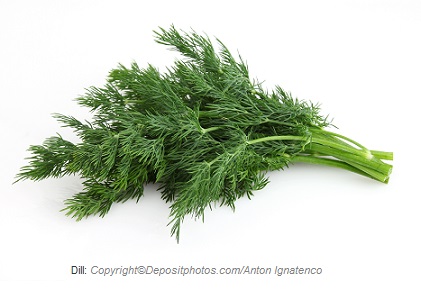Dill is a green vegetable with wispy and fernlike leaves, which are scented and are used to season and flavor foods, soups, and pickles. Every 100 grams of dill contains 7 grams of carbohydrates, 2 grams of fiber and 3 grams of protein.
season and flavor foods, soups, and pickles. Every 100 grams of dill contains 7 grams of carbohydrates, 2 grams of fiber and 3 grams of protein.
Average calories: 40 per 100 grams.
|
Dill: 100 grams |
|
|
Carbohydrate |
7 |
|
Fiber |
2 |
|
Protein |
3 |
|
Fat |
0 |
|
Calories |
40 |
Vitamins found in higher amounts: vitamins A, C, B2, B9 and B6. Every 100 grams of dill provides 7717 IU of vitamin A
Minerals found in higher amounts: manganese, iron, calcium, magnesium, and potassium. Every 100 grams of dill contains 200 mg of calcium and 735 mg of potassium.
Phytonutrients found in higher amounts and their health benefits: the phytochemicals present in dill are flavonoids and terpenoids. Kaempferol and vicenin are the flavonoids found in dill. They exhibit anti-oxidative, cardioprootective, anti-cancer and anti-inflammatory properties.
Cavone and limonene are the two terpenoids in dills. They are volatile oils that can activate the liver glutathione to scavenge free radicals. Terpeniods have also ability to trap and neutralize benzopyrenes. They are cancer-inducing compounds found in cigarette smoke, car exhaust fumes and charcoal grill smoke.

